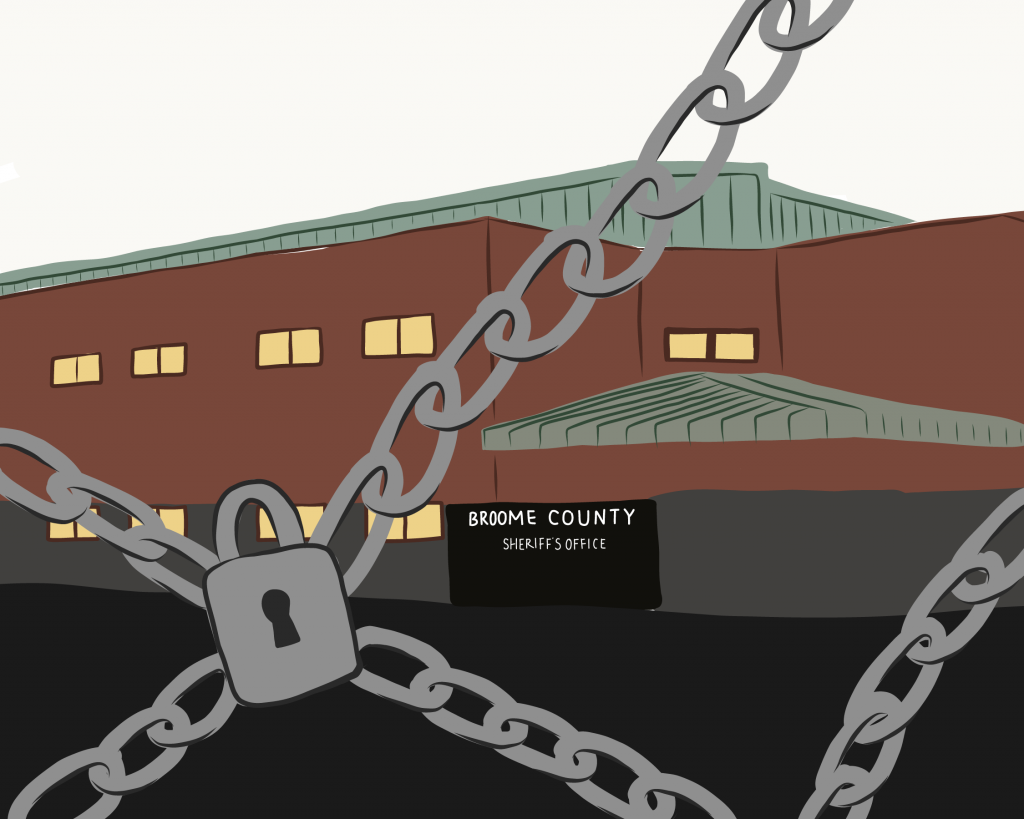Last May, Justice and Unity for the Southern Tier (JUST), a nonprofit organization that advocates against mass policing and incarceration in the Southern Tier of New York, and Megan Pond, a Broome County citizen whose partner is currently incarcerated at the Broome County Jail, filed a lawsuit against the sheriff of the Broome County Jail, David Harder, for prohibiting in-person visitation to the jail. The deciding trial was held in early August, and Broome County Supreme Court Justice Oliver N. Blaise III granted the plaintiff’s motion to require in-person visitation at the Broome County Jail, giving Harder until Sept. 5 to honor this order. However, Sheriff Harder and Broome County recently appealed this decision in late August.
For the past two years, incarcerated individuals have not been allowed any contact with family, friends or JUST volunteers — who provide emotional support and an outlet to express grievances regarding treatment and the conditions in the jail. Harder has argued that this is due to concerns about the spread of COVID-19. However, the jail also has a financial incentive to prohibit in-person visitation. As an alternative to in-person visitation, the jail utilizes a phone and video call system through which each incarcerated person is allowed only one free five-minute call a week, and they are charged 25 cents per each additional minute, 50 cents per photo, and 5 additional cents per minute just for using the tablet. Through a 2009 contract between the jail and Global Tel Link, the jail receives 40 percent of all revenue from phone calls, as well as 20 percent of the revenue from video calls and tablet charges. JUST has reported that the jail has profited over $1 million from these fees, which are six times what the state prison charges for calls, texts and video calls.
In addition to the financial incentive that the jail has to continue virtual visitation, Harder’s claims of concern over COVID-19 are hypocritical, as the jail has been accused of administering a disproportionately low number of COVID-19 tests compared to the high number of residents. The ja has also been accused of overcrowding incarcerated individuals throughout the pandemic, allowing incarcerated people in quarantine to share the same materials and common areas as those that are not, and not requiring incarcerated folks or corrections officers to be vaccinated. A New York Post article from April 17, 2020, revealed that at least 16 incarcerated individuals in the Broome County Jail had contracted COVID-19 after being forced to clean up after people that had tested positive for COVID-19 — without adequate protective equipment. It seems that correcting these malpractices would be much more effective in preventing the spread of COVID-19. If the jail is really worried about visitors bringing COVID-19, they can easily put policies in place that require visitors to show proof of vaccination or a negative COVID-19 test before entering the jail. Additionally, COVID-19 rates have been steadily declining in Broome County, and the jail has not seemed to report a surge in COVID-19 — a COVID-19 jail status report from Aug. 31 reported that only one incarcerated individual actively had COVID-19.
Most importantly, in-person visitation is crucial for the incarcerated to maintain relationships with family and friends. The families of some incarcerated people are unable to afford to pay the hefty fees for phone and video calls, and virtual visits do not provide nearly the same experience as in-person visitation, especially considering how isolating incarceration is. The lack of in-person visitation may cause lasting harm to the relationships of the incarcerated with their young children, especially because of how crucial physical contact and in-person interactions are for early relationship building. James Lynch, who is incarcerated at the Broome County Jail, said the expensive video call system has limited interaction with his 7-month-old son, and his son has even had trouble recognizing him. Furthermore, numerous studies have found that in-person visitation reduces recidivism — a 2007 study of Florida prisons found that each visit received by an incarcerated person reduced their odds of two-year recidivism by 3.8 percent. In addition visits have been found to reduce misconduct within carceral facilities, improve incarcerated people’s mental health and improve familial relationships.
Continuing to ban in-person visitation at the Broome County Jail is cruel and unnecessary. We suggest that the jail adopt other, more effective measures of responding to COVID-19, such as testing incarcerated individuals more frequently and reducing overcrowding, and allowing the incarcerated the little opportunity they have to maintain familial and friend relationships.



